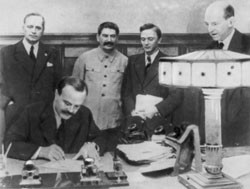dimanche, 30 août 2009
Short note on the Pacts of August 1939

Short note on the Pacts of August 1939
(The Pact of Mutual Help between UK and Poland
and the Molotov-Ribbentrop Pact)
Tiberio Graziani *
Considering the alliances signed by the insular Great Britain in the frame of their secular anti-European power politics, finalized at containing and defeating the aims of friendship and / or integration among the nations of the European Continent, it is worth mentioning - as an illustrative example - the Pact of Mutual Help between the UK and Poland, signed in London on 25 August 1939.
As known, the Anglo-Polish Friendship Treaty, signed by Lord Halifax and Count Rczynski, was a deliberate violation (1) of the similar Treaty that Germany and Poland had signed on 26 January 1934, and, above all, an explicit interference in the delicate relations between the National Socialist Reich and USSR; Berlin and Moscow, in fact, just two days earlier, on 23 August, had signed a non-aggression treaty, known to history as the Molotov-Ribbentrop Pact, named after their respective foreign ministers.
In this case, the United Kingdom intended to use - as part of a diplomatic-military device, theoretically equal, - the strategic position of Poland as a "splitter" between two continental powers in order to affect, simultaneously, both the creation of a potential axis Moscow -Berlin and the German-Polish agreements, and thereby removing any future potential perspective of welding / integration between the European Peninsula and the Asian continental mass.
The disturbing action devised by London, through a fine texture of diplomatic activities, which U.S. were involved (2), was perfectly consistent with British geopolitical doctrine, whose exploitation of the tensions between the continental nations constituted a key pillar of its equilibrium policy (balance of power).
1. Some months before, on 19 May 1939, a Mutual Help Agreement between France and Poland (probably on U.S. and U.K. request) was signed in Paris by Polish ambassador Juliusz Lukasiewicz and French Minister of Foreign Affairs, Georges Bonnet. For Berlin, and under some aspects for Moscow too, the two Mutual Help Agreement constituted a sort of threat for the continental peace.
2. We refer to meetings among U.S. Ambassador William Christian Bullitt, Jr. and the Polish Ambassadors Potocki and Lukasiewicz, which occurred in France in November 1938 and February 1939; see Giselher Wirsing, Roosevelt et l'Europe (Der Kontinent Masslose), Grasset, Paris, 1942, p. 266.
* Eurasia. Rivista di studi geopolitici (Eurasia. Journal of Geopolitical Studies – Italy)
00:05 Publié dans Histoire | Lien permanent | Commentaires (0) | Tags : europe, pologne, urss, russie, allemagne, deuxième guerre mondiale, seconde guerre mondiale, grande-bretagne, ribbentrop-molotov, relations germano-soviétiques, politique internationale |  |
|  del.icio.us |
del.icio.us |  |
|  Digg |
Digg | ![]() Facebook
Facebook



Les commentaires sont fermés.